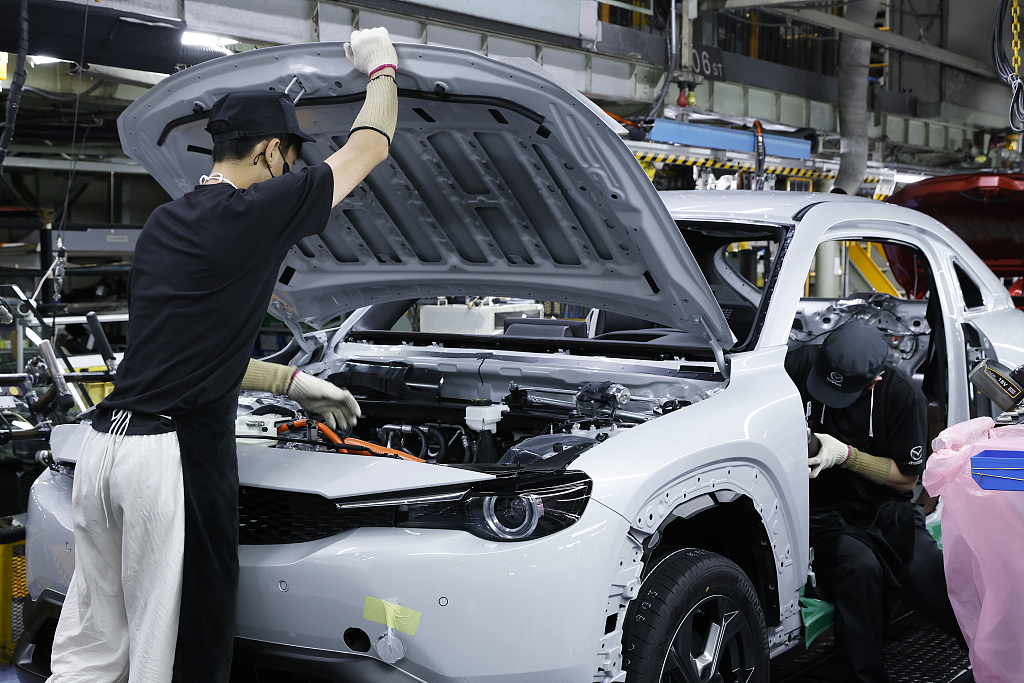
Editor's note: Hayat Bangash is a special commentator on current affairs for CGTN with degrees in business administration and war studies. The article reflects the author's opinions and not necessarily the views of CGTN.
As word got out of the Biden administration's new curbs on the export of computing chips to China, shares of American chipmakers nosedived. Though some of the firms later recovered, this is not the first time they are bearing losses due to the restrictive policies of the U.S. government.
Nvidia, the largest American chipmaker, is reeling under the pressure. Its Chief Executive Jensen Huang recently told The Financial Times that these export controls could cause enormous damage to the U.S. tech industry. He even went on to say that his company has been left with its "hands tied behind its back."
The situation is no different at the manufacturing plants of other chipmakers. China, as the world's largest semiconductor market, consumed 60 percent of the world's chips last year. But chipmakers in West-aligned countries are headed towards losing this lucrative market if the American policies continue.
In the latest round of restrictions, the U.S. – along with the Netherlands – is further limiting the export of chipmaking equipment to China. Companies would require licenses to export the equipment and would thus be tightly controlled by their governments.
The witch hunt began last October when the U.S. unilaterally decided that it wanted to curb the export of high-end chip manufacturing equipment to China. The Biden administration tightened the noose on American companies and lobbied other countries to take similar measures.
As the Netherlands followed through on its commitment to the U.S. on June 30, shares prices of ASML – Europe's largest tech company based in the Netherlands – and its local rival ASM International took an immediate hit.
Interesting to note is that Japan is joining the bandwagon while also being a country that has remained a target of similar restrictions by the U.S. in the past. In the 1980s, when the automobile sector of Japan was going strong, the U.S. felt threatened and imposed export restraints on Japanese automobile and semiconductor companies.

Workers assemble a vehicle on the production line in Fuchu Town, Hiroshima Prefecture, Japan, June 15, 2022. /CFP
Workers assemble a vehicle on the production line in Fuchu Town, Hiroshima Prefecture, Japan, June 15, 2022. /CFP
As a result, Japan's semiconductor industry was decimated. The U.S. was respecting its own interests much more than its commitments to its allies, even if the so-called liberal international order would have to become the collateral. If today the U.S. feels the same kind of threat from Japan – or even the Netherlands – it will not hesitate to slap them with similar curbs.
For Washington, a friend can at any moment turn into a foe. Who else can testify to this phenomenon better than Japan, whose semiconductor industry was once at the receiving end of American export restraints? This is exactly why American partners need to think twice before surrendering their right to formulate independent trade policies.
Then there is the element of hypocrisy in America's competition with China. The Biden administration, under its National Security Strategy, has taken up strategic competition with China as a priority but is falling short of upholding the moral and ethical standards of competition.
The virtues of competition in bringing about efficiency in the production of goods and provision of services have been advocated by the American version of capitalism for ages. Now, by limiting the exports of chipmaking equipment to China, the U.S. will have to lose the Chinese market, which will lead to a drop in revenue. This is why the latest round of curbs has become a hard sell to the American business community.
The measures the U.S. is taking against China will also discourage the inventiveness of American businesses that are important for the country's global leadership – but that's something of which the U.S. is quickly losing grip. On the other hand, the American tech restrictions are contributing to China's journey of self-reliance.
The U.S. should seriously reconsider its economic and trade policies that are misguidedly aimed at decoupling the two largest economies. These policies are more harmful to the U.S. than China. As the American investor Ray Dalio explained in his latest book The Changing World Order, the U.S. is deep into its decline in the Big Cycle of the rise and fall of great powers.
The U.S. might like to take a page from China's book that provides a level playing field to local and foreign businesses and stays true to opening up to the world.
(If you want to contribute and have specific expertise, please contact us at opinions@cgtn.com. Follow @thouse_opinions on Twitter to discover the latest commentaries in the CGTN Opinion Section.)